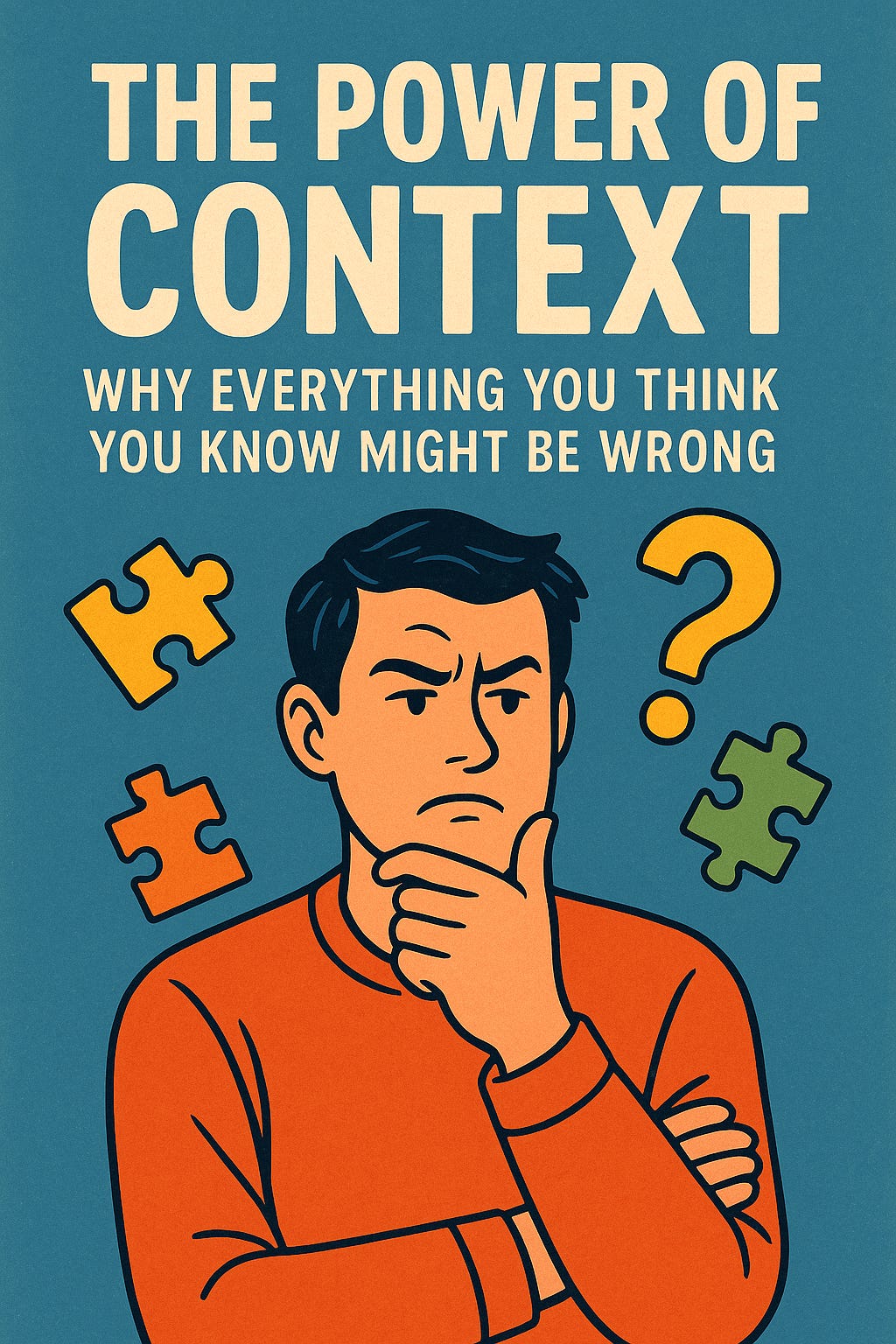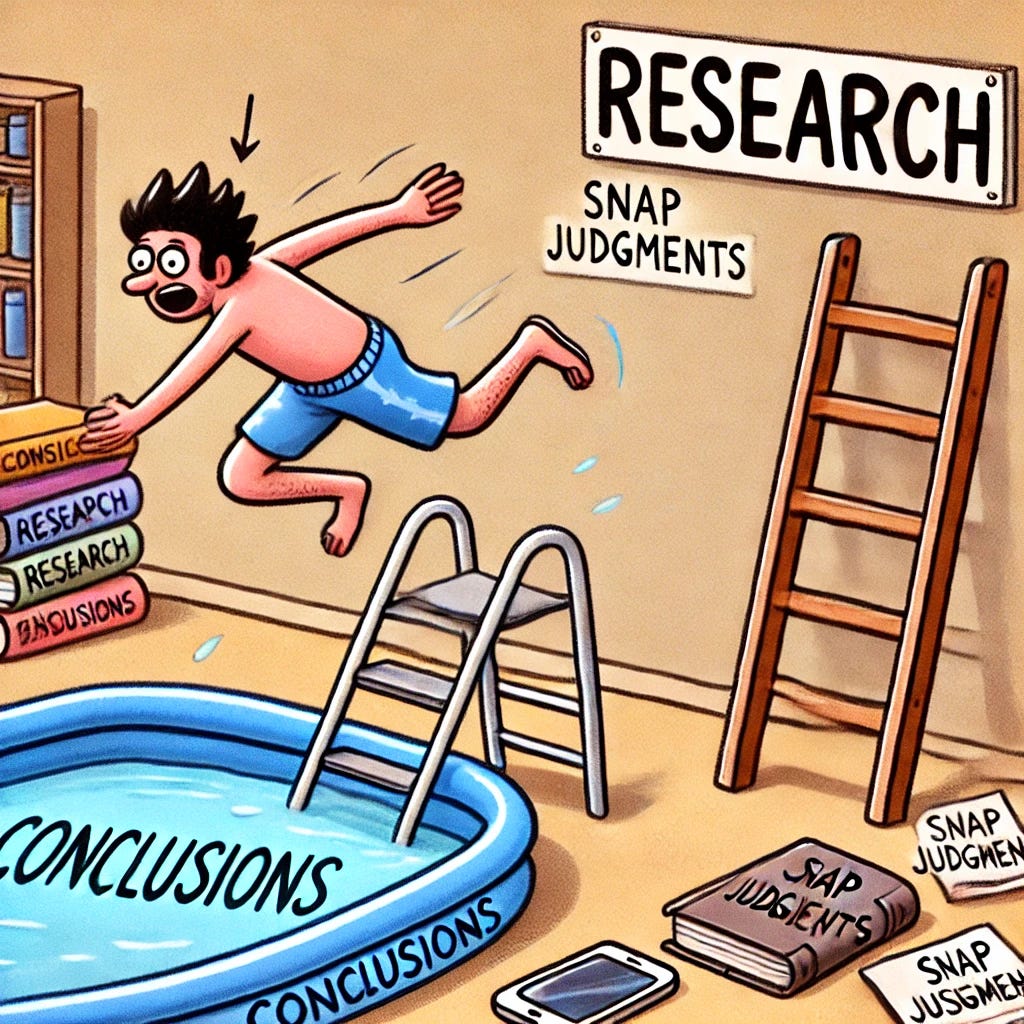The Power of Context: Why Everything You Think You Know Might Be Wrong.
In a world obsessed with hot takes and hashtags, here's a reminder that the truth usually wears layers — not headlines.
Picture this: You’re scrolling through your feed, and bam—another scandal. Someone’s been canceled, another “bad guy” exposed. Everyone’s picking sides like it’s a gladiator match, and you’re expected to grab your pitchfork or defend their honor. But here’s the thing—half the time, we’re yelling about stuff we barely understand.
Context, listen my friend, is like underwear—absolutely essential, yet so often forgotten. Without it, we make really dumb decisions, misunderstand people, and let’s face it, we 100% look kind of ridiculous.
The Story of Galileo (or, How Everyone Thought He Was Nuts)
Back in the 1600s, Galileo Galilei said something wild, something that could have sounded like: “Hey guys, maybe the Earth isn’t the center of the universe.” And you know what happened? The church threw a fit and put him under house arrest because, obviously, thinking differently was a crime at the time.
At first glance, the church looks like a bunch of insecure control freaks. But if you zoom out—like, way out—you’ll see they were dealing with some serious existential crises. The Protestant Reformation had just turned their world upside down, and Galileo’s “radical” ideas felt like another nail in their coffin and so got them thinking “What if people stop listening to us? What if they realize we’re not infallible? Oh crap…..”. Context doesn’t excuse their actions, but it sure explains them.
Fast-forward to today, and we’re still doing the same thing. Except now, instead of burning heretics, we’re canceling people over 10-year-old tweets and posts. Same energy, different platform. Basically reenacting the same drama, of course minus the fancy robes back then.
Why Context is Your Secret Superpower
I want you to think about a time someone really pissed you off. Maybe your coworker snapped at you during a meeting, or your best friend ghosted your texts. It’s easy to assume the worst—they’re rude, selfish, or just plain trash. But what if they’re dealing with a family emergency at the time or battling some kind of burnout? Suddenly, their behaviour makes a lot more sense, and you feel less inclined to block them on WhatsApp. Or Facebook. Or TikTok. Or X. Or wherever.
Context doesn’t just make you a better person; it saves you energy. Instead of jumping to conclusions (and, let’s be honest, embarrassing yourself), you can take a step back and say, “Hmm, what’s really going on here?” It’s like putting on glasses when you’ve been squinting all your life.
Social Media: The Context Killer
Here’s the problem: social media doesn’t do nuance. As simple as that. It’s a battlefield of hot takes, and the loudest voice usually wins. No one cares about the full story—they just want to know who to love and who to hate.
Remember that viral clip of Will Smith slapping Chris Rock at the Oscars some years back? For weeks, the internet exploded with opinions. “He’s defending his wife!” “He’s an aggressor!” “He’s a simp!”. But hardly anyone paused to ask, What’s the bigger picture here? Things like decades of unresolved trauma or the pressures of living in the public eye? Nah, too boring. Let’s just argue instead.
Lessons from the Past (and How Not to Repeat Them)
History is full of examples of people screwing up because they ignored context. The Vietnam War? A classic case of not understanding cultural and political nuances. The Salem Witch Trials? Panic + no context = innocent people being hanged.
The lesson here is simple: Context keeps us from making idiots of ourselves. Whether it’s a viral scandal or a political debate that we keep diving headfirst into ignorantly convinced we’ve got all the answers when we barely understand the question. Or whether it’s global politics or why your partner left the dishes in the sink (again), digging deeper always reveals more than you expected.
How to Use Context to Stop Messing Up Your Life

Slow Down, Speed Racer: Before reacting, ask yourself: Do I really know the full story? Nine times out of ten, you don’t.
Look for the Missing Pieces: Dig deeper. Ask questions. Read beyond the headline.
Accept That People Are Weird: We’re all a little broken, stressed, or just winging it. Remember that the next time someone acts like a jerk. You know, people are messy, situations are messy, life itself is messy, so you just gotta deal with it.
Conclusion
Context is the unsung hero of human understanding. It’s the reason Galileo’s ideas survived, why some conflicts escalate while others simmer down, and why your coworker might not actually be out to get you. The world isn’t actually black and white, my friend—it’s a kaleidoscope of grays, blues, and every other colour in between. And the sooner you embrace that, the sooner you’ll stop losing sleep over things that don’t really matter.
So, the next time you’re tempted to rage-tweet or cancel someone, stop and think: What am I missing here? Because odds are, it’s a lot. And in a world that thrives on half-truths and outrage, taking the time to understand the full picture isn’t just radical—it’s revolutionary.






